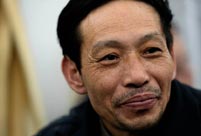 Int'l Snow Sculpture Art Expo in Harbin
Int'l Snow Sculpture Art Expo in Harbin Sichuan money wall for dividend payment
Sichuan money wall for dividend payment Li Na crashes Belinda Bencic in 2nd round at Australian Open
Li Na crashes Belinda Bencic in 2nd round at Australian Open
 Shocking moments when PLA's weapons open fire
Shocking moments when PLA's weapons open fire Famous Lanzhou beef noodles
Famous Lanzhou beef noodles Armed Police hold anti-terrorism drill in SE China's Xiamen
Armed Police hold anti-terrorism drill in SE China's Xiamen Harbin Int'l Ice and Snow Festival opens
Harbin Int'l Ice and Snow Festival opens 'Jin' named the word of the year by cross-strait netizens
'Jin' named the word of the year by cross-strait netizens Chinese scientific expedition goes to build new Antarctica station
Chinese scientific expedition goes to build new Antarctica station
BEIJING, Jan. 26 -- Bumper harvests for the last ten years and the government's perennial stance on guaranteeing ample grain for the people, have made scarcity a stranger to Chinese dinner tables.
In the face of urbanization and industrialization with their constant appetites for more and more land, authorities have ringfenced at least 1.8 billion mu (120 million hectares) of arable land for farming, which, so far, has been enough to feed one fifth of the world's population.
Rice and wheat are the Chinese favorites. Against all odds,self-sufficiency of the staples has stayed around 97 percent of home supplies and less than 3 percent of imports.
For more than a decade, the emphasis has been on farming and this year, top significance has been given to food security.
China hopes to ensure the "absolute security" of key staples while striving for near self-sufficiency in grain. That will be no mean feat for a nation of 1.3 billion but per capita arable land of less than half the world's average, combined with numerous environmental woes such as floods, droughts and earthquakes.
Behind the years of agricultural achievement, authorities have constantly prepared for underlying risks and warned of complacency, as grain production is increasingly afflicted by strained supplies of farmland and water. Soil pollution, food wastage, and dwindling enthusiasm for farming all ring alarm bells.
Under this internal pressure and in the context of globalization, authorities are refining strategies and meeting people's new demands for more choice that improved lifestyles have brought.
For now, imports of staples are low. The majority of food imports are soy beans, a major source of edible oil, tofu, and animal feed.
Ensuring that domestic supplies remain dominant and more active use of imports will enhance food security, while showing the world the way.
One pressing issue is agricultural development and how to make it sustainable. Much is expected. The government's overall policy on agriculture explicitly seeks such solutions. The government is well aware that secure bottom lines will ensure self-sufficiency and will take more concrete measures to improve the rural land system and rural governance while providing more financial support to farmers.
Persistence has shown that agricultural development seeking better grain security is a path we can trust.
 A 60-hour journey home
A 60-hour journey home Int'l Snow Sculpture Art Expo
Int'l Snow Sculpture Art Expo Highlights of China's air force
Highlights of China's air force Airline crew stage flashmob dance at Kunming airport
Airline crew stage flashmob dance at Kunming airport Top15 countries to retire to in 2014
Top15 countries to retire to in 2014 Hot supermodel's new photo album released
Hot supermodel's new photo album released Asia's heaviest box girder finishes 'rotation' in Wuhan
Asia's heaviest box girder finishes 'rotation' in Wuhan Completed facade of People's Daily new headquarters
Completed facade of People's Daily new headquarters Chinese-branded car passes North America standard safety test for the first time
Chinese-branded car passes North America standard safety test for the first time Li Na beats Bouchard to reach Australian final
Li Na beats Bouchard to reach Australian final  Explore the sources of PM 2.5
Explore the sources of PM 2.5 Highlights of Chinese airborne troops'exercises
Highlights of Chinese airborne troops'exercises  'Living in ice house' competition held in central China
'Living in ice house' competition held in central China  Chinese figure in Oscar nominations
Chinese figure in Oscar nominations  Top ten aerospace events in China 2013
Top ten aerospace events in China 2013Day|Week|Month